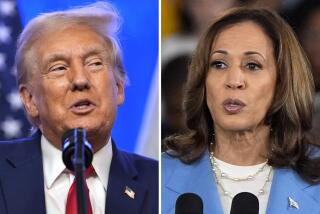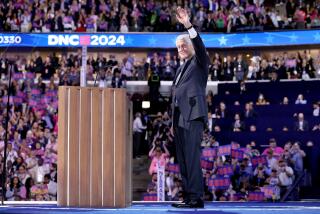Clinton Calls for Continuity Until January, Reassures Allies : White House: President-elect begins planning the transition of power. He seeks to send a message that he is moving swiftly on nation’s economic concerns, aide says.
LITTLE ROCK, Ark. — President-elect Bill Clinton moved Wednesday to reassure international allies and domestic financial markets by issuing a call for continuity until he takes office in January and asserting that the nation’s fate remains in President Bush’s hands until then.
Speaking to reporters in the back yard of the governor’s mansion here, Clinton also said he will seek a bipartisan approach to foreign policy.
“I urge America’s friends and foes alike to recognize as I do that America has only one President at a time,” Clinton said. “America’s foreign policy remains solely in (Bush’s) hands. And even as America’s administrations change, America’s fundamental interests do not.
“The greatest gesture of goodwill any nation can make toward me is to continue their full cooperation during this period with our one President, George Bush. And . . . the greatest mistake any adversary could make would be to doubt America’s resolve during this period of transition.”
Even as he spoke of continuity, however, Clinton was planning for the formal takeover of power on Jan. 20. He met Wednesday with members of his presidential transition team. But he refused to answer questions from reporters about what had transpired.
Clinton’s senior campaign staff said the message that the Arkansas governor seeks to send this week is that he is moving swiftly to grapple with the nation’s concerns.
“The message is we’re ready to get to work, ready to work on the mandate that people offered yesterday--a mandate for economic change,” said George Stephanopoulos, the campaign’s communications director.
Neither Stephanopoulos nor any of Clinton’s other chief aides, however, could offer concrete details of the President-elect’s transition priorities.
Asked at a morning briefing if he would discuss the broad outlines of what was being considered by Clinton and his transition team, Stephanopoulos said flatly, “No.” He also said Clinton had made no decision on when he might resign as governor and move to Washington in preparation for assuming the White House.
Technically, Clinton could remain governor until January, but he is expected to resign well before then. There are complicating factors, however: The governor and his wife, Hillary, are said to be trying not to disrupt their 12-year-old daughter, Chelsea, who hopes to finish out the school semester in Little Rock.
It was also unclear who would formally head the transition effort and how long it would be run from Little Rock. Clinton aides Wednesday said they presume that a senior cadre of advisers would remain in the city as long as Clinton does, and that eventually the bulk of the transition work will be done in Washington.
Clinton’s statement on foreign affairs and domestic policy was a traditional move by an incoming President, and it served to set out the litany of the world problems that Bush will hand off to him.
“I look forward to working closely with President Bush during this period to ensure continuity on global affairs of interest to all Americans, from continued progress in the Mideast peace talks, to completing negotiations on the details of the START II arms control agreement, to making progress on a good agreement on our world trade talks, to bolstering Russia’s fledgling democracy, to working toward peaceful resolution of the conflict in the republics of the former Yugoslavia, to assisting the victims of famine in Somalia,” Clinton said.
The financial markets had fluctuated mildly in recent weeks as Clinton’s election became more and more expected, and he aimed a mollifying message Wednesday in that direction.
“Today, I say to our financial and business leaders that, although change is on the horizon, we understand the need to pursue stability even as we pursue new growth,” he said. “The changes I seek will strengthen America’s market systems, not weaken them.”
Clinton was uncharacteristically circumspect on the morning after his election, tossing off only a few sentences to reporters who questioned him after he had breakfast at a friend’s home.
Asked what he was going to do during the day, Clinton declared: “I’m going to take a nap.”
He said he had not yet been called by world leaders but had received telephoned congratulations from some members of Congress. He would not say which ones.
After breakfast, Clinton met with Democratic National Committee Chairman Ronald H. Brown and several members of his transition team, including campaign chairman Mickey Kantor (a Los Angeles lawyer), attorney Warren Christopher (who also practices in Los Angeles), former San Antonio Mayor Henry Cisneros, former Vermont Gov. Madeleine Kunin, civil rights activist Vernon Jordan and Thomas (Mack) McLarty, a prominent Arkansas businessman and old friend of the governor’s.
Clinton’s campaign press secretary, Dee Dee Myers, suggested that he might take his time before announcing any major appointments.
“The (vice presidential) selection process is the best model,” she said, referring to the several weeks of discussions that occurred before Clinton named Sen. Al Gore of Tennessee as his running mate.
Myers said: “Clinton’s going to take his time and announce his decisions when he’s comfortable with them. He’s not committed to any particular timetable.”
On the morning after their victory, Clinton’s senior aides were trying to do two somewhat conflicting things simultaneously--claim a mandate from his election and play down expectations for the first part of his presidency.
Strategist Paul Begala, as well as Stephanopoulos, argued that Clinton had won a mandate from the American public despite having won barely more than four out of every 10 votes cast. Instead they spotlighted the 370 electoral votes he won by carrying 32 states and the District of Columbia.
“A mandate is not a margin, to begin with, and when you carry the number of states that Bill Clinton carried and when you carry them the way he did, when you run on a specific agenda for change, then you have an obligation and you have the authority to enact those changes,” Begala said.
But he repeated a cautionary note that Clinton himself has emphasized increasingly as the election drew near, that “none of this will happen overnight; it will take time.”
Although the entire campaign hierarchy was understandably proud of Clinton’s victory, opinions differed about whether the triumph signaled a permanent realignment in the nation’s political boundaries.
“We still have a lot of work to do in the South,” strategist James Carville said. “We didn’t find the key to the electoral lock here. We just picked it.”
But Clinton pollster Stan Greenberg heralded the results as one that will “redefine politics.”
“As there was a Reagan era beginning in 1980, we believe there will be a Clinton era where both parties will be sorting out their identities and where they will find their new bases of support,” he said.
Whatever the impact, Clinton aides could not have been happier at the results. Of the 32 states they targeted at the beginning of the general election campaign, Clinton won all but one--North Carolina, which he lost by a narrow margin. Of the remaining states, which were not targeted, Clinton won only one--Nevada.
Carville credited Clinton with being “the best presidential candidate in my lifetime” and said the campaign’s strategy of reacting to Bush often and aggressively was key to the Democrat’s victory.
“It’s just like in a boxing match. If they keep throwing punches and you keep fighting them off--I think (Bush’s) hands were heavy in the last 10 days,” Carville said.
Although victory was undeniably sweet, Clinton and his team appeared to be having some trouble adjusting to his new status.
The governor ventured outside the gates of the governor’s mansion Wednesday morning with his wife, Hillary, intending to walk to the friend’s house where they were having breakfast. But as he did so, television crews and photographers surrounded them.
Visibly upset, Clinton snapped, “C’mon, let’s get out of here”; he and Hillary then jumped into a trailing limousine.
The growing pains were also evident--more comically--when, at a midday briefing for reporters, Stephanopoulos issued a brief statement and then opened the floor for questions.
The first one: How many hours of sleep did Clinton get last night and what did he have for breakfast?
Stephanopoulos paused, then grinned.
“It’s a new world,” he said, shaking his head. The answer, for the record?
“I think he slept for about 5 1/2 hours and I have no idea what he had for breakfast.”
* RELATED STORIES, ELECTION TABLES: A3, A5-A14, A29, A36, A38, B1, B3, B4, D1, D2
More to Read
Get the L.A. Times Politics newsletter
Deeply reported insights into legislation, politics and policy from Sacramento, Washington and beyond. In your inbox three times per week.
You may occasionally receive promotional content from the Los Angeles Times.











